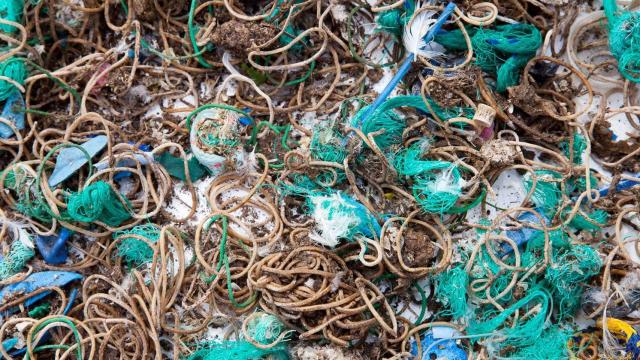British conservationists have figured out why a protected island near the UK’s southwest coast is littered with thousands of elastic bands.
Mullion Island is an uninhabited island on the eastern coast of Cornwall county in the southern UK. The tiny landmass measures only about 260 metres across. Because the entirety of Mullion Island has been set aside as a bird sanctuary, anyone wanting to visit the rocky outcrop requires a special permit.
Recently, rangers with the UK National Trust — an organisation dedicated to the preservation of Britain’s historical and natural places — were alerted to something odd on the island: thousands of elastic bands strewn along the shoreline.
“We first noticed the bands on a monitoring visit during the breeding season and were puzzled why there were so many and how they’d got there,” Mark Grantham, a researcher with the West Cornwall Ringing Group — an organisation that tracks the movement of birds — said in a National Trust release.
Not wanting to disturb the nesting birds, Grantham and his colleagues waited until this spring to return to the island to clean up the mess.
“Within just an hour we’d collected thousands of bands and handfuls of fishing waste,” he said.
That fishing waste included small bundles of green fishing net and twine, some of which took the form of small pellets — a telltale sign the indigestible waste had ventured through an avian digestive system.
In a press release published Wednesday, rangers from the National Trust say they’ve finally figured out what’s going on: Great black-backed and herring gulls, both of which roost on the island, are confusing the rubber bands for worms. The gulls are apparently snatching discarded bands from agricultural fields on the mainland and bringing them back to Mullion Island. The elastic bands can get stuck in their stomachs, preventing the birds from feeding on the real worms that would nourish them.
This is a sad example of the unforeseen consequences of human carelessness, and how even protected sanctuaries are not immune to our waste.
The Trust is now asking local businesses to consider alternative ways of disposing plastic, latex, and other materials harmful to wildlife.
“Single-use materials are having an alarming impact on our country’s most remote places,” Lizzy Carlyle, head of environmental practices at the National Trust, said in a press statement. “It’s up to all of us to take responsibility for how we use and dispose of these items — whether we’re producers or consumers.”
Seagulls might not seem like vulnerable birds, but their populations are on the decline. The numbers of great black-backed gulls — the largest species of gull in the world — have dropped by 30 per cent in recent years, and herring gulls are on the UK’s Red List of Birds of Conservation Concern. Threats to Britain’s seabirds include declining fish stocks, loss of habitat, warming seas, entanglement in fishing nets and ingestion of plastics, according to the National Trust.
“Ingested plastic and rubber is another factor in a long list of challenges which our gulls and other seabirds must contend with just to survive,” said Holder.
